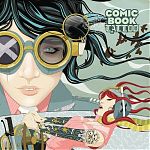- Articles
- Cherries
- Minutiae
- Q&A
- RAINN
- Releases
- Reviews
- Site News
- Them
- Toriphiles
- Touring
- TV/Radio/Web
- Video
News Archives
Keep an eye on our Twitter and Facebook pages since we often post quickie updates there when we're on-the-go.
During tours, we do our best to cover setlists in real-time on Twitter. If you want to tweet a show in, just DM or @ us on the day and tell us to watch your stream that night.
Tori is touring in 2017 to support the release of Native Invader. The European legs runs from early September through early October and the North American leg runs from late October to early December. We do not know if additional dates elsewhere will be added.

Native Invader (album, 2017)

Unrepentant Geraldines (album, 2014)

Gold Dust (album, 2012)

Night of Hunters (album, 2011)

Midwinter Graces (album, 2009)
 Abnormally Attracted To Sin (album, 2009)
Abnormally Attracted To Sin (album, 2009)
Live at Montreux 1991/1992 (DVD, 2008)

American Doll Posse (album, 2007)

A Piano (boxed set, 2006)

Pretty Good Years
(bio, 2006)

Fade To Red
(DVD, 2006)
 Comic Book Tattoo (book, 2008)
Comic Book Tattoo (book, 2008)News: All Hip Hop Interview (September 25, 2007)
One of the big corners of my life is Public Enemy’s Fear Of A Black Planet. Nobody would know that was the inspiration behind Little Earthquakes; but it was. That’s the truth. [laughs] Energetically, this is a woman fighting for her soul and they were fighting for their souls. You know what we should do that would be kind of crazy? It would be fun to see what three Hip-Hop songs I can cover on this tour.
Some of you may remember years ago when Tonedeff sampled “Cloud on my Tongue” for his song “Circles,” which also made copious references to Tori’s lyrics. Now, Tonedeff — along with Kathy Iandoli — interviews Tori for All Hip Hop and gets some unusual thoughts out of her.
Additionally, Tonedeff also blogged about the interview where he confesses to being floored by Under The Pink and cites Tori as biggest musical inspiration. (Thanks Jena!)
Tori Amos is Hip-Hop
By Tonedeff and Kathy Iandoli
Tori Amos might appear to be an unlikely fit for a Hip-Hop website. The legendary singer/songwriter/producer has a career that spans well over two decades, with a cult following that will outlive any existing fanbase for some flash in the pan artist. With 13 albums under her belt, along with countless bootlegs, EPs and imports, Tori Amos has never faltered in delivering her unapologetic message to the world. However, Hip-Hop might be vaguely familiar with her cryptic cover of Eminem’s “’97 Bonnie and Clyde,” where Amos sings from the viewpoint of the mother in the trunk. Now, on the brink of a new tour, Tori Amos would like YOU to decide her next rap cover. What better way to dig deep into the mind of a genius, than through the mind of her biggest fan? AllHipHop gave critically acclaimed MC and Producer Tonedeff the opportunity of a lifetime to chat with his muse to discuss her career and how she was the catalyst in his creating Hip-Hop music. With discussions including censorship, the state of music, and Public Enemy, Tori Amos proves that she has the balls of an MC with the rhetoric of a poet. If that’s not Hip-Hop, then what is?
Tori Amos: Before we go forward, tell me what it is that you do.
Tonedeff: Pretty much to sum it all up, I am a producer and emcee. I’ve been doing it for a really long time. I’ve released an amount of albums since I’ve started my own record label in 2001. It’s called QN5 Music. I’ve released about three CDs under my name, Tonedeff. The last one I did is called Archetype – that was the album that I really wanted to push the boundaries of what is typically expected of a rapper. It’s a singer/rapper album.
Tori Amos: Wow! That’s exciting!
Tonedeff: Yeah, it’s definitely something new. I’m singing and playing the piano and incorporating it into a Hip-Hop format – which is something that I’ve learned all from you; which is why I am really excited about doing this interview with you.
Tori Amos: Well, I would really like to hear that. I would really like to write that down, I’ll find it. You don’t have to send me a copy. I’ll buy it. I really want to hear it. Sometimes, I’m not as exposed as I want to be. That’s just the truth. Maybe you’re exposed to a lot, but when you’re creating, sometimes you don’t have the time that you want to take in because you’re busy creating. You’re under the inspiration.
Tonedeff: Yeah, that’s true. When you’re working on an album it’s easy to be influenced by what else is going on out there to come up with something original.
Tori Amos: That’s the time that I put stuff in my brain, I call it the “input period,” where you collect ideas, and thoughts, and it becomes a part of my sonic thoughts. Then, you have to shut the doors and start to use what you’ve collected in order to create something. I support what you’re saying. You can start making work that’s too close to something else. You don’t want to do that. Nobody wants to steal. There are only 12 notes so you have to be careful!
Tonedeff: Let me first just start off by saying that you are the one artist in my life that has completely changed everything that I know. Literally, I’ve taught myself how to play the piano, sing, and write songs at the age of 18. I don’t have any formal training, I do it all by ear. This is all because of [you]. Did you ever think that you’d be having a conversation with a rapper based on your role as inspiration?
Tori Amos: Well, no because sometimes I’m consumed with my own war. To be able to make the music that I’ve made over the years, you have to figure that I’m not totally naïve about the music business. You’re not either since you’re quite involved in it. Sometimes, in order to retain the commitment in creating work that might not be what the people that love the industry understand, as what is going to be what generates quote-unquote “sales and commerce.” You have to be so committed to what you’re doing. Sometimes, it’s a lonely road. When I hear that you have been moved by it, sometimes, it makes it all worth it.
Sometimes; something as simple as this conversation. You have to figure that there are some of us on the front line and they are taking a lot of bullets. A lot of people don’t know that you are, and I don’t need anybody to take my bullets for me. I can take them just fine. But there is a side when you’re going up against corporate all of the time, and having to find your own funding for your own tours because you’re not going to compromise. It does affect me, because all of this work and commitment has moved somebody. The fact that it has moved one person, like you, makes this all worth it.
Tonedeff: That’s really awesome, that’s really great.
Tori Amos: I kind of needed to hear this today. It’s so strange how these things work. [laughs] See, my birthday is tomorrow. You wonder sometimes in life, you ask questions, “Should I have done this differently?” “Should I’ve done that differently?” You know you do. There are certain stages when you’re like, “Should I have done this that way?” Well, if I had, I might not be talking to you right now. How would I have known how that would affect my life?
At the same time, you’re going to ask yourself about purpose and why you’re making music. What is your destiny? Why do you do it? It’s easy to get seduced — and you know this better than anybody — you make records for all kinds of reasons. Right, so you have to remember why you’re doing it and so do I.
Tonedeff: Definitely, and just in general, I know that at this point in my career making music is more of a therapeutic type of thing. I’ve kind of gotten away from trying to be #1 Mr. Pop Star. I literally write from the inside out. At this point, I don’t even go trying to bother shooting for charts. These are all things that I’ve kind of taken away from your work, which lyrically is kind of my next point. What you do lyrically is amazing. From an emcee or a writer, I try to filter the world and put my own little spin on it so that people from a rather unique perspective can appreciate it. This I think you do beautifully.
You make really, really profound statements. Another thing about you is that you are very careful with your words. I’ve seen your writing process on video. I’ve seen you at your piano. You let the moment take control of you. You have your pen in your mouth and you’re just slamming away at the keys as you jot things down. When you write your songs is this your normal process? Is it completely spontaneous? Or do you sit down and map out what you want to do per song?
Tori Amos: Yes. There are many moments to making music, and when those moments happen, there is nothing like it. That is something that is out of my control. When it happens, I drop everything and I try to jot it down. It can be two or three things. Sometimes, it’s not a lot. Collect those moments that happen to you over time. Sometimes, it takes years for one to find their way into a song just because you cannot honestly just bring something in. It has to work architecturally. You collect these little ideas. Sometimes, you get more than the two that are phrased. When those moments come, then there is nothing that I can really explain. If you’ve had that happened to you, then you know what that feels like.
The other side of the mountain is a disciplined, routine way of writing, of hammering your way. For example, working on this album for hours and hours of just hammering away at taping it and listening to it back. It’s really hard to listen back. After an hour or an hour and a half, then I may have something worth keeping or listening to. Then I go back to hammering and doing it again. You’ll have razors of colors and then you’ll begin to have this sonic building. You’ll begin to see what kind of shape it’s going to take.
Tonedeff: With that said, I’d like to talk a little bit about lyricism. I really want to get in your head in terms of this. Lyrically, I know that you’ve said some generally provocative stuff. With songs like Leather, Precious Things, there are times when you’ve cursed in your records and I love that. Pardon my French but, you do whatever the f*** you want, and that’s just the way that it has to be. I love that about you. In that sense, have you ever found yourself being self-centering when you’ve had to protect someone else’s feelings?
Tori Amos: To be great you can’t do that. I’m sorry. I can’t dissolve. You can’t dissolve. I’ll change the name, but I don’t use names. If I do, they are not the real ones. That’s as far as I go. Luckily for me, I married the right guy. He’s an engineer. He’s like, “I don’t want to know what the songs are about and I like them now. If you want me to like them, please don’t tell me what they are about.” That’s our rule. That’s why it works. Once you start compromising the content because you’re walking on egg shells then I’m sorry you don’t get the chance to be a part of the mother f**king writers. Good bye!
You’re a really good writer, but you can leave the room. That’s the way it is. Now as a writer, yes I have a conscious but my conscious is to respect the syllable and the time. Do I understand the word association? That is my job as writer. Do I understand the music? Do I understand what it is telling me? Do I want it to be a paradox? Do I want it to be a melody? It’s a double agent. That is where the morality comes in at. The morality comes in as being a clear and divine creativity. You have to stand by everything that you say, and if I’m going to be creative, take the money, and take the publishing, then I have to stand by the consequences. You understand? So if I’m going to talk about cutting up guys penises, which I haven’t, then I have to be willing to stand by that – right?
That’s what bugs me when writers say it and don’t mean it. So if you’re going to talk about cutting up a girl’s p***y, then you better stand by that mother f***er. [laughs] You can’t take the publishing. You cannot do it. Otherwise, you’re George Bush, and Dick Cheney. You cannot do that! The true thing is that they’re not being hypocrites. They’re being exactly who they say they are [politicians]. If you’re going to say it, even if you’re angry, you say it and stand by it. You have to be willing to take the heat when people question it. You can’t say, “Oh, I’m sorry.” So what I’m saying to you is that it’s a double edged sword. That’s what I’m saying to you, Tone. You have to be able to stand by it. I’ve been angry in songs, and I’ve said some things. I’ve thrown some stones at people and it’s okay.
As a writer, you have to do that. Not all writers are there to stir it up. Some are there to really make you think of rainbows and sunshine. Sometimes, I roll my eyes at them. I respect them because that’s who they are. You and I both know you have to know what kind of writer you’re trying to be. You will say something’s that will rip the skin off of people. You don’t try to expose the people, but the feeling. Everybody knows if they walk into my life they’ll never know when they’ll end up in a song. If you walk into a room where I am, you’ll be in a mill – if you’re interesting. If I’m good, you won’t know it’s you.
Tonedeff: Being that this is AlHipHop.com, I want to pick your head about this a little bit. You have been notorious for your live-covered versions of your songs; I’ve seen you live at least 12 times now, which is kind of scary. You’ve done entire cover versions, which keep your little spin on it. You’ve even done a full album cover with Strange Little Girls. You have a version which is [Eminem’s] Bonnie and Clyde. One of the creepiest things that I’ve heard is that if you flip it, it brings another side of the song. That made it diabolic. I don’t think Eminem had that in mind when he wrote it. How did you create that?
Tori Amos: Well, this is my job — a part of it. A part of my job in life is to crawl into the piece itself and then you’ll be able to allow it to become you. It’s the idea that when we go back to Native American ideas and shifting. If you allow the song to come alive in your own being, then you have to get yourself out there. I understand that I’m talking to you in a theorist way, it’s not very tangible. But you have to be able to walk into the dream world in order to be able to let [out] somebody else’s song child — it’s a dangerous thing; it’s almost like kidnapping.
I’ve sat and talked to all of the songs, I’ve talked to their spirits. I look at it as a psychic study. You go into the psyche of the piece, because that tune of the mother was a man; I crawl into it to listen the anima — the female psyche of the piece. I’ve decided to take on their character and I’ve listened to everything she was saying. She wasn’t exactly dead. When you kill your ex-wife, you don’t know if she’s exactly dead until she’s dead. She wasn’t dead yet. She heard everything he was saying to her daughter. I couldn’t think of nothing more harrowing than hearing your child being told something that you can’t defend. That’s the last thing she hears and she dies. I thought that was incredibly tragic.
My persona is that I think that [Eminem] is a great writer. I was like, “Listen here you little groovy hipsters, if you’re going to dance with your little cocktails and what have you, if you’re going to dance in the blood of this woman, then I’m going to give you something to think about. You know I’m not a nice lady. I’m a mother f***er. Ask my daughter. If you stop by my house, I’ll give you cookies and spaghetti. But if you ask me to cover your tune, I’m going to kick your a**. Hopefully, you’ll look back and see what type of job you’ve done and see what type of song you’ve written. If you’ve written a good song, then it has the ability to have a good perspective. It was a great song, I’m acknowledging that.
Tonedeff: Seeing that you’ve been able to crawl into a song and see it from a different perspective — I think that this has been something that has come up in music as far as different perspectives and the collage of music to make something new — with you, I’ve noticed that with certain songs, you’ve used samples. How do you feel about other artist sampling your work?
Tori Amos: I hope I set the sample rate. My lawyers tell me that I did. For example, Matt Chamberlain, we’re always trying to do things if we’re not using something else. Like I set the sample rate — I think it’s important. Matt comes up with making the samples himself. I think loops are incredibly exciting to write to and play to. They really excite me. Sometimes, I am a bit naughty. Sometimes, I listen to a loop and write over it and then I go back and write over it again. You got to do what you got to do. As long as you know, okay — I’m honest. I see how one woman in a movie seduces her husband and I use her technique in my way to apply it to a song. I do that.
One of the big corners of my life is Public Enemy’s Fear Of A Black Planet. Nobody would know that was the inspiration behind Little Earthquakes; but it was. That’s the truth. [laughs] Energetically, this is a woman fighting for her soul and they were fighting for their souls. You know what we should do that would be kind of crazy? It would be fun to see what three Hip-Hop songs I can cover on this tour. Maybe we should have them vote them in, and then you can be like, that’s a good idea but ah no! It needs to be these three. And please, softly, pull out the big artillery and I really want you guys to think that I can’t do it. I want those to be the ones that I do. I want them. Don’t jerk off with me.
Tonedeff: I’m going to pull out my NWA album right now.
Tori Amos: N***as with Attitude, give them to me!
Tonedeff: [laughs] I love this woman!
Tori Amos: Now, I have to hold up my end of the bargain; it has to be done. I have until the 18th of December. Now, the people have to send in their thoughts. It’s nice to see what people think. Even though it’s you to decide what comes in the end, it’s still nice to see what they think.
I have to tell you what I think is the shame, in music; we get divided into our own categories. I was overseas in Belgium, and some of those people had been so filtered in. Some of the people there had been there. Granted it’s very different music, they don’t open themselves into, say Hip-Hop, because they get distracted by the packaging. They don’t like it because it’s talking. It’s rapping. I want an energetic experience. I want lift off, man, I want that lift off. As a female singer and song writer, there is no f***king lift-off. I’m sorry but I can’t even wang myself off into something that exciting. I’m sorry, but I can’t. Where am I going to go?
Tonedeff: I can’t believe you don’t see the flaws in someone else’s performance.
Tori Amos: Well, let’s take this a step further: a live performance for you and a live performance for me. You and I are a tribe. We’re a part of the same tribe, but we do two different things because the tribe has to be when you put your hands on that 220 voltage, you have to be willing to let it take you where it’s willing to take you. You have to be willing to be completely blown to smithereens by the energy. You have to serve the creative force, but that also means that you can’t then do it just for the ego or the commercial success.
Most of the commercial success does not come to the dangerous poets and performers. That is because you’re threatening the status quo way too much. They won’t give us that must air time. It depends. You can slip through the cracks, but if it isn’t shocking then you’ll have your moment of time. Don’t think that they don’t know who we are. They know who we are! If you’re trying – you’re either there to emancipate the soul of the masses so that they can be as powerful as they need to be, but understand that they won’t need us anymore. It’s a sacrifice.
I do this because I know they’re going to stand around me and say, “Thank you Tori, but it’s time for you to go now.” You got to be able to let it go, and that’s doing it for the right reasons. When you come to my show, I’ve been to shows too where you just watch, but I look at them and they are just sucking the life out of their audience. They’re emotional vampires and they are sucking the f***ing life out of their audience. Instead of coming together so that they are both exposed. It becomes this ceremony, which is a very different thing, instead of hysterically raping this audience. It blows my mind how people keep coming back to get rammed in the a** again. It really does!


